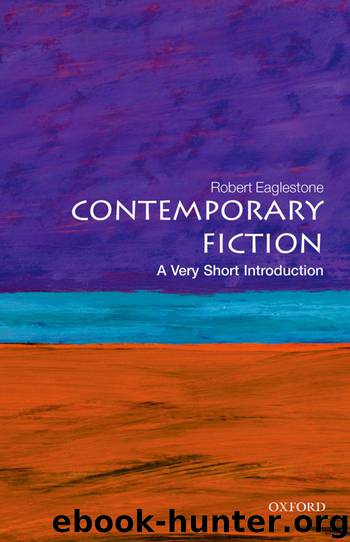Contemporary Fiction: A Very Short Introduction (Very Short Introductions) by Robert Eaglestone

Author:Robert Eaglestone [Eaglestone, Robert]
Language: eng
Format: epub, mobi
Publisher: Oxford University Press, USA
Published: 2013-07-24T16:00:00+00:00
Conclusion
In this chapter, I’ve tried to explore emblematic versions of the new ways in which contemporary fiction engages with the past. Sarah Waters’s Fingersmith clearly and cunningly admits its ‘costumery’, and so directly challenges the more established conventions of the historical novel by making explicit the anachronism implicit in all historical fiction. Yet at the same time it deploys this self-consciousness to make a point about the ways in which lesbians have been written out of history and fiction, while providing a thrilling plot. Javier Cercas’s Soldiers of Salamis engages in the memory politics of Spanish history in an attempt to heal the collective trauma of the Civil War, while Aleksandar Hemon’s The Lazarus Project finds itself exploring not the resolution of collective trauma but precisely the confused and complex moments in which events are turned into conflicting and contested memories. History haunts Hemon, and others, but a ghost can be ignored. In contrast, Nicola Barker’s long and experimental novel Darkmans tries to focus precisely on what I have called ‘possession’: the ways in which, unavoidably or unknowingly, the past holds and shapes people in the present.
Of course, these don’t represent all the possible ways to engage with the past: for example, Anne Michaels, in Fugitive Pieces (1997), her beautiful and lyrical novel about the memory of the Holocaust, writes that the past is like the layers of rock on which we stand, perhaps unknown to us but still there, and it rises within us in strange ways. Péter Nádas’s Parallel Stories (2005, trans. 2012) is an encyclopedic epic, covering the whole history of Middle Europe, centring on Hungary, from the Second World War; Patrik Ouředník’s Europeana (2001 trans. 2005) retells a similar history laconically, laced with black humour. Some critics suggest that there has been a turn to the past in contemporary fiction because novelists are finding the new technologies too hard to write about, or because the past is somehow easier than the present as a subject, or out of a new conservatism in writing. As I’ve suggested, because of the nature of anachronism, this is a strange idea: whatever the problems of the present, writing about the past is writing about the present, whether the fiction evades this fact or, more interestingly, faces it head on.
I think what is more interesting is both why and how the past has become a subject for contemporary writing in these new and challenging ways. The great philosopher of history, Hayden White, pointed out nearly fifty years ago that the ‘modern artist does not think very much of what used to be called the “historical imagination” ’ and indeed that ‘one of the distinctive characteristics of contemporary literature is its underlying conviction that the historical consciousness must be obliterated if the writer is to examine with proper seriousness those strata of human experience which it is modern art’s peculiar purpose to disclose’. He adds that many, many great writers reflected ‘the conviction voiced by Joyce’s Stephen Dedalus, that history is the
Download
Contemporary Fiction: A Very Short Introduction (Very Short Introductions) by Robert Eaglestone.mobi
This site does not store any files on its server. We only index and link to content provided by other sites. Please contact the content providers to delete copyright contents if any and email us, we'll remove relevant links or contents immediately.
| Booksellers & Bookselling | General |
| History of Books |
4 3 2 1: A Novel by Paul Auster(12358)
The handmaid's tale by Margaret Atwood(7732)
Giovanni's Room by James Baldwin(7307)
Asking the Right Questions: A Guide to Critical Thinking by M. Neil Browne & Stuart M. Keeley(5743)
Big Magic: Creative Living Beyond Fear by Elizabeth Gilbert(5730)
Ego Is the Enemy by Ryan Holiday(5396)
The Body: A Guide for Occupants by Bill Bryson(5067)
On Writing A Memoir of the Craft by Stephen King(4921)
Ken Follett - World without end by Ken Follett(4709)
Adulting by Kelly Williams Brown(4556)
Bluets by Maggie Nelson(4536)
Eat That Frog! by Brian Tracy(4503)
Guilty Pleasures by Laurell K Hamilton(4428)
The Poetry of Pablo Neruda by Pablo Neruda(4082)
Alive: The Story of the Andes Survivors by Piers Paul Read(4013)
White Noise - A Novel by Don DeLillo(3993)
Fingerprints of the Gods by Graham Hancock(3980)
The Book of Joy by Dalai Lama(3963)
The Bookshop by Penelope Fitzgerald(3829)
